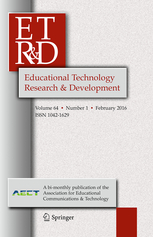The impact of the instructional planning self-reflective tool (IPSRT) on pre-service teachers' performance, disposition, and self-efficacy beliefs regarding systematic instructional planning
This study investigated the impact of a self-regulatory tool, the Instructional Planning Self-Reflective Tool (IPSRT), on preservice teachers’ performance, disposition, and self-efficacy beliefs regarding systematic instructional planning. Participants enrolled in an introductory educational technology course were taught how to develop an instructional plan as part of the course. An experimental group was provided with instruction on how to use the IPSRT while engaging in instructional planning. Results indicated that the experimental group demonstrated greater skill acquisition, showed more positive disposition, and reported higher perceived instrumentality of instructional planning. In terms of self-efficacy, no significant differences were found between the two groups. However, further analyses revealed that participants who were initially high in self-efficacy reported significantly lower self-efficacy following the tool intervention; in contrast, participants initially low in self-efficacy showed significantly higher self-efficacy following the tool intervention. Findings are discussed from a social-cognitive perspective.

